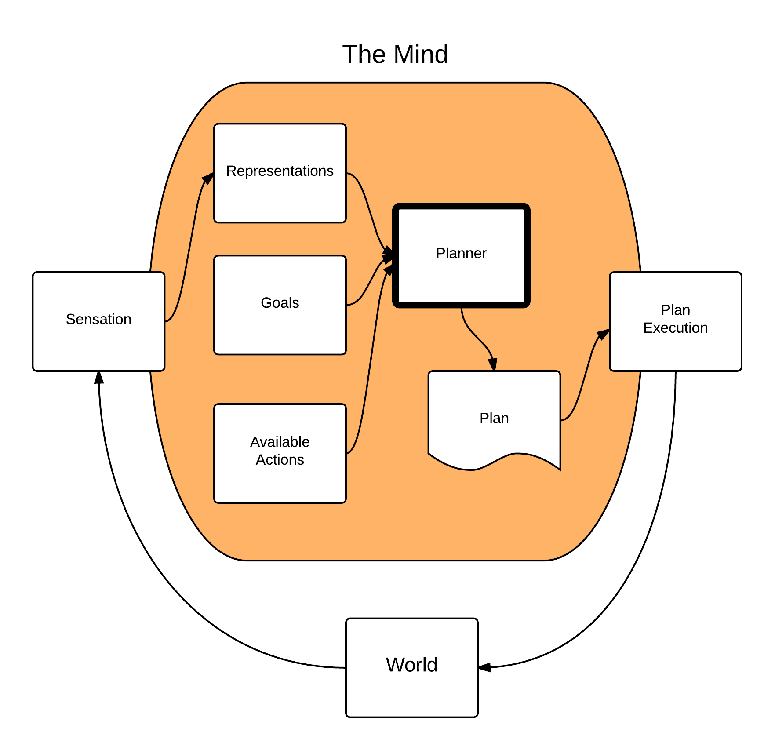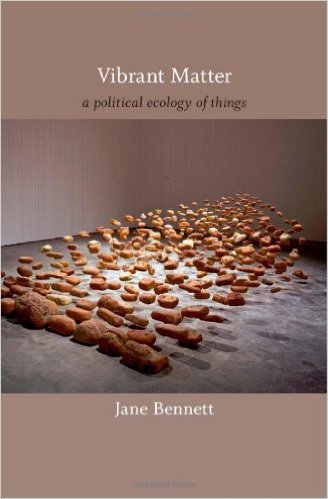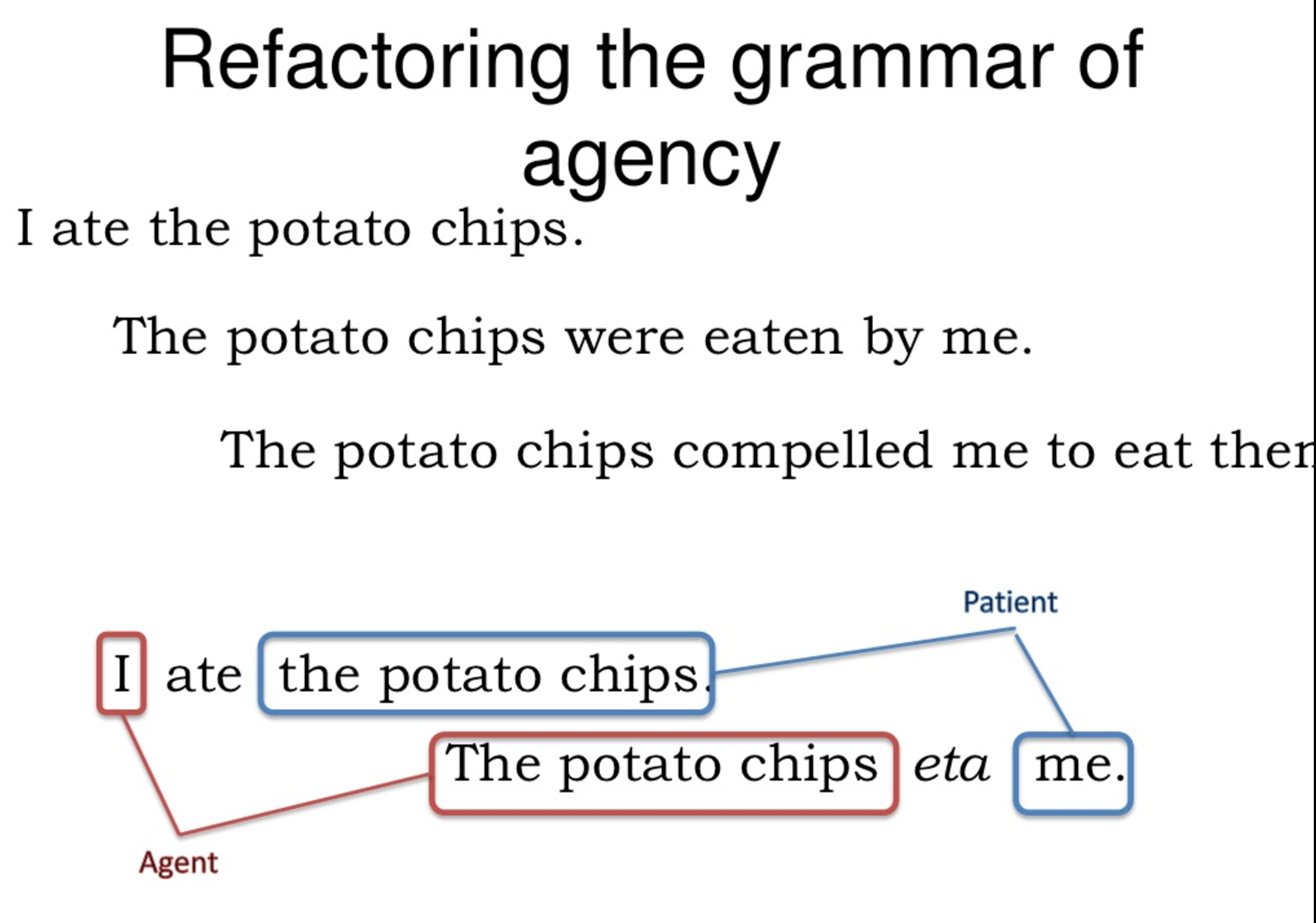As If: a theory of representation & play
Mike Travers
mt@hyperphor.com
Refactoring the Mind
General outline
- AI/cognitivism/rationalism
- A search for alternatives
- Consequences, if any
Cognitivism

Cognitivsm (2)
- minds are collections of representations, goals and actions
- these are largely independent things
- there is some kind of machinery that turns them into plans and actions
- there is other machinery that senses the state of the world and updates the represenations
Problems with Cognitivism
- Seems unbiological
- Sensation and action are decoupled
- Planning is NP-hard (Chapman!)
- As theory of mind, implies a homuncular recursive regress
- And other unsovable philosophical problems (qualia, symbol grounding)
Qualia

Mental representation: the default thoery
- Cognitive Science and Rationalism have an implict theory of mental representation
- that is, that there are structures in the brain that mirror or model in some way the external world
- in GOFAI, symbolic structures like
(IS DOG MAMMAL)or(MAMMAL HAS HAIR).. - But this model goes way beyond AI and cogsci, it՚s the default western model of the mind, just taken to a formalized extreme.
But is it right?
- There՚s no particular reason to believe this is the only or best modularization of mind
- I don՚t feel like my mind is a collection of assertions.
- “Mind as Container” is a powerful metaphor, but just a metaphor
Why care?
- Technical: how do we build AIs or software in general?
- Psychological: how do we think about the contents of our own minds?
Stabs at Postcognitivism
- Embodied Cognition
- Heideggerian AI
- Animal Behavior
- Orality
- Emotion
- Narrative
- Play
Does it matter?
- Maybe a dead letter today now that AI is statistical and not very cognitive?
- LW Rationalism still seems in thrall to the standard bad model
- The mistake (if it is one) seems deeply baked into our default metaphysics – it՚s hard (but necessary) to get beyond it
Stab: Embodiment
- cognition tighly coupled to:
- body (senses and effectors)
- physical situation
- dynamics vs planning
Stab: Animal Behavior
- Assume human cognition didn՚t come into being ab initio
- but is based on existing mechanisms found in animal minds
- chemotaxis (direct coupling of sensation to action)
- ???
- human cognition (no direct coupling)
- Not clear what ??? is, but clearly more closely related to “take benefical action” than “represent the world accurately”
- Ethological drive models (Tinbergen) emphasize both purposiveness and distributed agency
Tinbergen drive theory

- Too simplistic and hydraulic, but…
Stab: Orality
- Agre՚s Writing and Representation
- Ong՚s Orality and Literacy
- CogSci idea representation is based on writing.
- Mental symbols look like words on paper, not speech
- But speech is more primal
What would a more Oral theory of mind look like?
- Oral language is just different, it is connected to the body and breath and action and real live interaction with other people
- There՚s this tendency to valorize one or the other which I am trying to avoid. I՚m certainly a better writer than speaker, but I don՚t thereby think writing is better or worse than speech – it՚s just a different form of language and thus cognition.
- writing can just sit there on a page (or in a memory cell) waiting to be read (or exectued). In preliterate cultures, words are not like this – they only exist when animated by an individual՚s breath, and only for a particular small social context. I wish I could feel and communicate how weird this must really be.
- since the human language mostly developed for orality with a very recent overlay of literacy, it seeems obvious that orality is a better framework to think about mental machinery than writing.
Stab: Narrative
- Representations are less like declarations of fact, more like stories
- episodic
- concrete
- goal and action oriented
- An old idea in AI (Schankian scripts)
- Trendy concept in academia
- Dennet, “Self as Center of Narrative Gravity” (also Jerome Bruner, Charles Taylor, Paul Ricoeur)
Narrative Inteilligence
Reading group / underground movment at MIT Media Lab

Anti-narrative
Strawson, “Against Narrativity”
Stab: Emotion
- “Emotions and the Dynamics of Representation Use” (1992)
- My attempt to synthesize ideas from Minsky and situated action
- enactive representation
“The basic idea of enactive representation is that representations are not objective encodings of states of the world, but subjective encodings of past experience. Representations are used to anticipate and evaluate the results of possible actions. They do this by re-enacting or simulating past experiences.”
- Minsky, k-lines
“The primary use of representation is imaginative, in that it is used to perceive what isn’t actually at hand. An enactive representer imaginatively re-enacts a past action in order to predict the result. Action becomes not only a matter of adaptive reaction to the world (as it is in situated action systems) but of reacting to imaginings about the world's future. “
Ex:
- you touch fire, you feel pain
- next time you see fire, you enact feeling pain
- the imagined feeling causes real behavior changes
- the resulting dynamics is what we call “fear”
Kegan!
- imagining more complex situations and chains of reactions involves modeling the self
- development of the self as a sequence of reactions to enacted representations of situations
- especially introjected reactions of other people
- Kegan, object relations
Stab: Pan-agency / neovitalism
- Standard model: the world, and representations, are passive things, acted on by agents (selves)
- Since agency is fictive, try refactoring it, or scattering it everywhere
Distributed Agency
- Minsky’s Society of Mind
- (and precursors: Tinbergen, Freud)
- EO Wilson’s Ant Colonies
- Hewitt’s Actor Model of Computation
- George Ainslie՚s picoeconomics
Other neo-vitalists
- Christopher Alexander:
from Pattern Language to a radical metaphysics of the living
- Bruno Latour and followers:
A democracy of objects
Vibrant Matter

Refactoring Agency
‘In the case of … potato chips, it seems appropriate to regard the hand’s actions as only quasi- or semi-intentional, for the chips themselves seem to call forth, or provoke and stoke, the manual labor…To eat chips is to enter into an assemblage in which the I is not necessarily the most decisive operator”
– Bennett, Vibrant Matter
The agency of potato chips

Stab: Play
Play as a cognitive primitive
- Basic to the operation of the mind
- Appears early in evolution
- Used as a component of more complex phenomena
for example
Bateson՚s theory of animal play
- Play involves a kind of framing or quoting of normal behavior
- Signals on two levels
- Level 1: “I՚m fighting!”
- Metacommunication: “But not really!”
“it is evident that a very important stage in this evolution [of play signalling] occurs when the organism gradually ceases to respond quite automatically … and becomes able to recognize the sign as a signal: that is, to recognize that the other individual's and its own signals are only signals, which can be trusted, distrusted, falsified, denied, amplified, corrected, and so forth.”
The machinery of play
- the ability to put “not really” scare quotes around a mental state
- seems equally useful for basic intelligent action!
- lookahead rather than planning.
- That is, to choose a course of action,
- in a manner that isn՚t merely reacting to current stimuli
- You need to envision the future consequences
In both play and proto-planning, your mental machinery has to somehow recreate mental states corresponding to situations that are not actually present, and similarly feign mock versions of the actions that would normally respond to them.
Play as a cultural primitive
Huizinga, Homo Ludens
- Play is an essential constituent of culture
“civilization arises and unfolds in and as play. ”
“Now in myth and ritual the great instinctive forces of civilized life have their origin: law and order, commerce and profit, craft and art, poetry, wisdom, and science. All are rooted in the primaeval soil of play.”
Taking play seriously
- I don՚t mean to be giving a talk on how I think play is great and we should all be more playful – that would be kind of trite (although not untrue)
- More, like there is some important underlying phenomenon there that we haven՚t really grasped.
- Nor do I want to find some sort of evolutionary or utilitarian justification of play, because that seems wrong in a different way.
We have only to watch young dogs to see that all the essentials of human play are present in their merry gambols. They invite one another to play by a certain ceremoniousness of attitude and gesture. – Huizinga
The very existence of play continually on the supra-logical nature of the human situation. Animals play, so they must be more than merely mechanical things. We play and know that we play, so we must be more than merely rational beings, for play is irrational
Takeaway
- The symbolic computation view of mind is kind of broken
- Play is this weird, interesting, universal phenomenon.
- There՚s a possible similarity between the machinery of play and the machinery of intelligent action.
- Interested in applying this idea to the design of computational systems.
